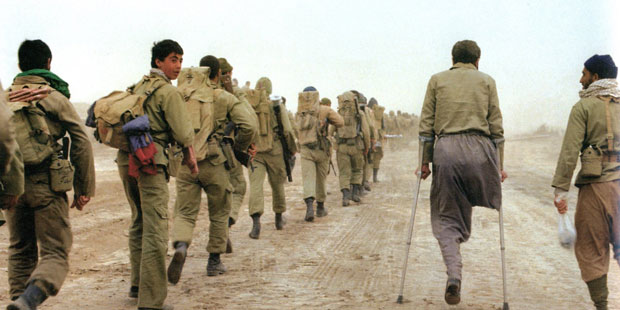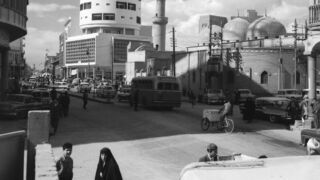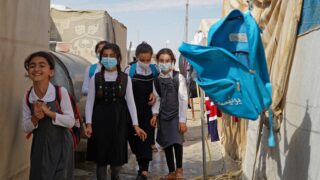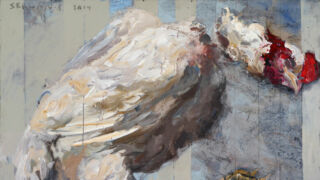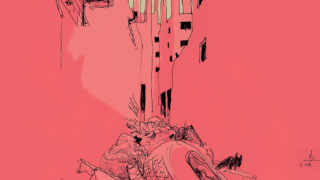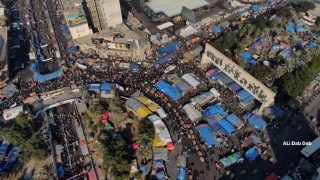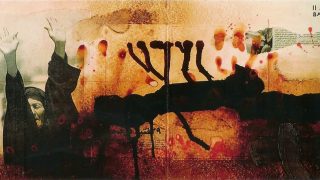The decades since have seemed to be an ever-increasing disaster of war and strife, but for many Iraqis the ghosts of the bloody struggle with Iran in the 1980s still linger, in the form of the missing, those tens of thousands of boys who never came home, either alive or in a coffin.
I had not realized until now that for all of these years they had been keeping the hope alive. My family, all of them toiling in the workshop, patching and tuning the engine of hope, keeping it from breaking down entirely. And then a few days ago the phone rang with the news that a wave of Iraqi prisoners of war were going to be returning from Iran. And suddenly they were all asking me: "Why don't you ask your connections about him? He might be part of this wave of returning prisoners."
So they had not forgotten him. It has been 26 years since he went missing in action, but they resurrected him effortlessly: his life, his stories. He is my family's Don Quixote, who held aloft a wooden sword to spar with the days, though in the end the days betrayed him. Hussein. He still grips their minds in spite of all the wars and suffering they have lived in the years since he vanished.
I knew the rumor was false, that they were just deluding themselves that he might return. But I nevertheless start following a Facebook page about Iraqi prisoners from the war with Iran.
It relays information from former POWs about comrades who died in captivity and were buried in Iran. They know the names of some of their fellow prisoners, and remember nameless others. My uncle Hussein may be one of those whose stories are being repeated day after day now. What leads me to the Facebook page is not idle curiosity or coincidence, but the story of the 400 POWs returning, up in the northern province of Suleimania. My cellphone has been ringing continuously with all of my aunts and their children insisting that we search the names of the returned for 'Hussein Fadel Abdallah,' their youngest brother who went missing in the Iraq-Iran war.
And my family is not the only one to renew its memories of its POWs, of its missing and its dead. All of the cruelest and most ferocious battles of that war are well known, even by those who were born long after they ended. The horseshoe-shaped 'Jasim River' in the province of Basra is no hideaway for lovers or fishermen, but a river of blood and suffering whose name will be forever linked to the vilest of battles. The names of all of those who went missing during the battles there still haunt its banks. My uncle Hussein was one of them.
My grandmother talked to me about him so much that at one point in my childhood I thought he was a famous literary character. He was a lover, handsome, a poet, a musician, fearless. And he was drafted and sent to the front in the war, to be added to the list and become another one of the missing.
Some time after he went missing, Hussein's body was brought back to us. But my father and grandmother refused to accept it: they had brought the wrong body; the body of an Iranian who was trying to be buried in the Najjaf. It was during a moment when rumors flourished that Iranian soldiers were looting the identification cards of Iraqi POWs, in hopes that if they were later killed in battle, they would be sent to Iraq and buried in the Wadi al-Salam graveyard, the largest cemetery in the world, located near the shrine where the body of the imam Ali Ibn Abi Talib rests forever.
The war left vast scars on Iraqi society; it is the pivot on which rest uncountable Iraqi novels, theater plays, stories and poems.
In spite of her grief over Hussein, my grandmother still found a way to feel glad about the fact that he had been unmarried when he left. There was a deeply tribal explanation for her relief: widows of the war's martyrs were being married off to the brothers of the martyrs, so that his children and property would remain inside the family, things like the house and the car that the government awarded as blood money to the families of the martyrs. There was a time when the news of the death of a soldier was all that was needed, in order for his brother to run and set himself up in his bedroom, dress up in his personality. An extraordinarily primitive custom, but it actually occurred frequently.
But then as the years passed, some of the martyrs returned, having been POWs, and when they came home and found their wives married to their brothers, some lost their minds, and others shot their brothers with guns, and still others just decided to forget it all and move on to new lives and new tragedies. But Hussein, my uncle, never came back.
That is war: wherever it sets down it brings only destruction, and this one lasted eight continuous years and turned a deaf ear to more than thirty separate initiatives to stop it. Its weapons came from every country, and human lives were fed into it like wood into a fire with no one there to gather the ashes. The Iraq-Iran war has no documented figures for its casualties. The Iraqi regime under Saddam Hussein waged to war on behalf of the Gulf monarchies, and was only publicly interested in heroic actions and pompous speeches. The victims were only fuel to keep the war alive, and its captured soldiers were the pride of the government, men who had "sacrificed their lives to defend the nation's honor."
On the other side, Iran was interested in glorifying its own revolution and its new Islamic state, and so did not publicize its losses, only announcing its repeated victories against Iraq.
Figures are therefore conflicting, but according to one set, more than a million were killed, while the Iranians captured a further 75-85,000 Iraqi soldiers[Iraqi Center for Strategic Studies]. Around 36,000 prisoners were returned to Iraq in 1990, but then Saddam Hussein's new war put a halt to the process of exchanging POWs.
After Baghdad was invaded and occupied in April of 2003, Iran started to send back those POWs whom it still held. According to official figures, 8,467 POWs had returned to Iraq by 2012. They were dispatched in different waves over that time. What was the point of keeping thousands of POWs in its jails for all of those years, until there was a friendly government in Baghdad? No one knows. In 2012, the International Red Cross announced that there were no further Iraqi prisoners of war in Iran, and closed the file. The problem was that at the same moment, the head of the red cross delegation in the region was asserting that there were still 220 POWs in Iran, a contradiction which left a good deal of uncertainty in the situation. At the end of 2013, the Iraqi parliament's committee on human rights announced that Iran was still holding 400 Iraqi soldiers; a statement that resurrected the hopes of the families of missing-in-action soldiers, who total 52,785 according to the central bureau of statistics.
In Iran, some of the Iraqi prisoners of war had become leaders of expatriate political parties dedicated to overthrowing the regime of Saddam Hussein; they returned home with the American invasion to take high political offices in the Iraqi government. They were called the 'repenters.' Others, numbering around 1,600, had infiltrated into the south of Iraq just before Saddam Hussein's downfall. After the regime's fall, some 5,922 Iraqis returned, with the Iranian wives they had married, the children they had born, hoping to find the Iraqi wives they had left behind.
And so from the first moment that they started asking me, I knew that this rumor about a new wave of returning POWs was a lie. But the happiness that swept over my aunts and my father had to last for a little while. They needed, for a time, to get lost in the sea of hope in which they were rowing with all of their strength. But when I realized they were going to far away, I tried to pull them back to the shores of reality, to explain that it was all a lie. They preferred to hang on to their hope. "Whether it is true or it is a lie, it did open for us the door of hope for the return of our sons," one woman wrote on the POWs Facebook page. My own aunt said that "there is no smoke without fire." And the government repeats its promises about continuing the search for missing POWs in Iran, while the families wait. Will their sons ever come home?
Translated from Arabic by International Boulevard

